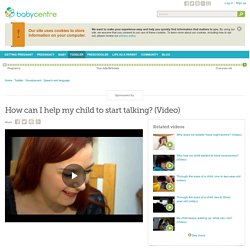

Symbolic play and language development. 1. Introduction 1.1. Scientists Say Child's Play Helps Build A Better Brain : NPR Ed. Deion Jefferson, 10, and Samuel Jefferson, 7, take turns climbing and jumping off a stack of old tires at the Berkeley Adventure Playground in California.
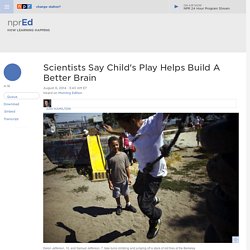
The playground is a half-acre park with a junkyard feel where kids are encouraged to "play wild. " David Gilkey/NPR hide caption toggle caption David Gilkey/NPR Deion Jefferson, 10, and Samuel Jefferson, 7, take turns climbing and jumping off a stack of old tires at the Berkeley Adventure Playground in California. This week, NPR Ed is focusing on questions about why people play and how play relates to learning.
When it comes to brain development, time in the classroom may be less important than time on the playground. "The experience of play changes the connections of the neurons at the front end of your brain," says Sergio Pellis, a researcher at the University of Lethbridge in Alberta, Canada. The cognitive benefits of play: Effects on the learning brain. © 2008 - 2014, Gwen Dewar, Ph.D., all rights reserved Science supports many of our intuitions about the benefits of play.
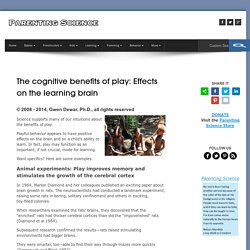
Playful behavior appears to have positive effects on the brain and on a child’s ability to learn. In fact, play may function as an important, if not crucial, mode for learning. The magic of child-directed play. Play to Learn: Discussion. Play to Learn. Why play-based learning? (free article) - Early Childhood Australia. Play to Learn. Importance of play for babies & children.
Different types play. How young children learn English through play. ZERO TO THREE. What Parents Can Gain From Learning the Science of Talking to Kids. The widening education gap between the rich and the poor is not news to those who work in education, many of whom have been struggling to close the gap beginning the day poor children enter kindergarten or preschool.
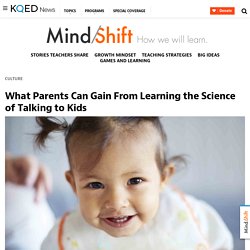
But one unlikely soldier has joined the fight: a pediatric surgeon who wants to get started way before kindergarten. She wants to start closing the gap the day babies are born. When Dr. Dana Suskind began doing cochlear implants on infants at the University of Chicago—a cutting-edge surgical technique that allows once-deaf babies to hear—in her follow-ups with families she noticed a stark difference in how the now-hearing children acquired language. Once they could hear, some children’s language skills thrived and grew, while others languished. The difference turned out to be the words children heard from their parents and caregivers, millions of them. For Suskind, a lightbulb went on. Bringing Parents On Board Of course, some words are more powerful than others. . * Tune In. Patricia Kuhl: The linguistic genius of babies.
Alison Gopnik: What do babies think? How young children learn English as another language. By Opal Dunn, educational consultant and author Introduction Young children are natural language acquirers; they are self-motivated to pick up language without conscious learning, unlike adolescents and adults.
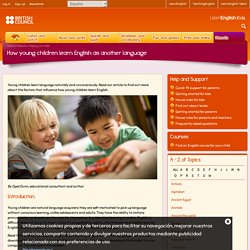
They have the ability to imitate pronunciation and work out the rules for themselves. Any idea that learning to talk in English is difficult does not occur to them unless it’s suggested by adults, who themselves probably learned English academically at a later age through grammar-based text books. Read the notes below about young children learning English as another language. Why does my toddler love repetition? Paediatric speech and language therapist.
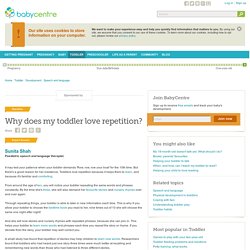
It may test your patience when your toddler demands 'Row, row, row your boat' for the 10th time. But there's a good reason for her insistence. Toddlers love repetition because it helps them to learn, and because it's familiar and comforting. From around the age of two, you will notice your toddler repeating the same words and phrases constantly. By the time she's three, she will also demand her favourite stories and nursery rhymes over and over again. Let's Talk.
What do babies need in order to learn and thrive? One thing they need is conversation — responsive, back-and-forth communication with their parents and caregivers. This interactive engagement is like food for their developing brains, nurturing language acquisition, early literacy, school readiness, and social and emotional well-being. A dispiriting number of children don’t get that kind of brain-fueling communication, research suggests. In early childhood policy (and in the wider media), much attention has been paid to the so-called word gap — findings that show that low-income children hear 30 million fewer words, on average, and have less than half the vocabulary of upper-income peers by age three. But putting that alarming number in the spotlight obscures a more critical component of the research, says Harvard Graduate School of Education literacy expert Meredith Rowe: it’s not so much the quantity of words but the quality of the talk that matters most to a child’s development.
Listen to Your Mother. Young children face a remarkable challenge in learning to use the language of their culture. Toddlers vary widely, however, in the rate at which they learn new words.1 A team of Harvard Graduate School of Education researchers set out to ask whether and how children's language environment can impact vocabulary development. How do you speak 'Motherese'? Deb Roy: The birth of a word. The Woman Who Changed Her Brain: Barbara Arrowsmith-Young at TEDxToronto. How can I help my child to start talking? (Video) Health visitor Sara Patience describes how you can help develop your child's language skills by talking and playing with her.
